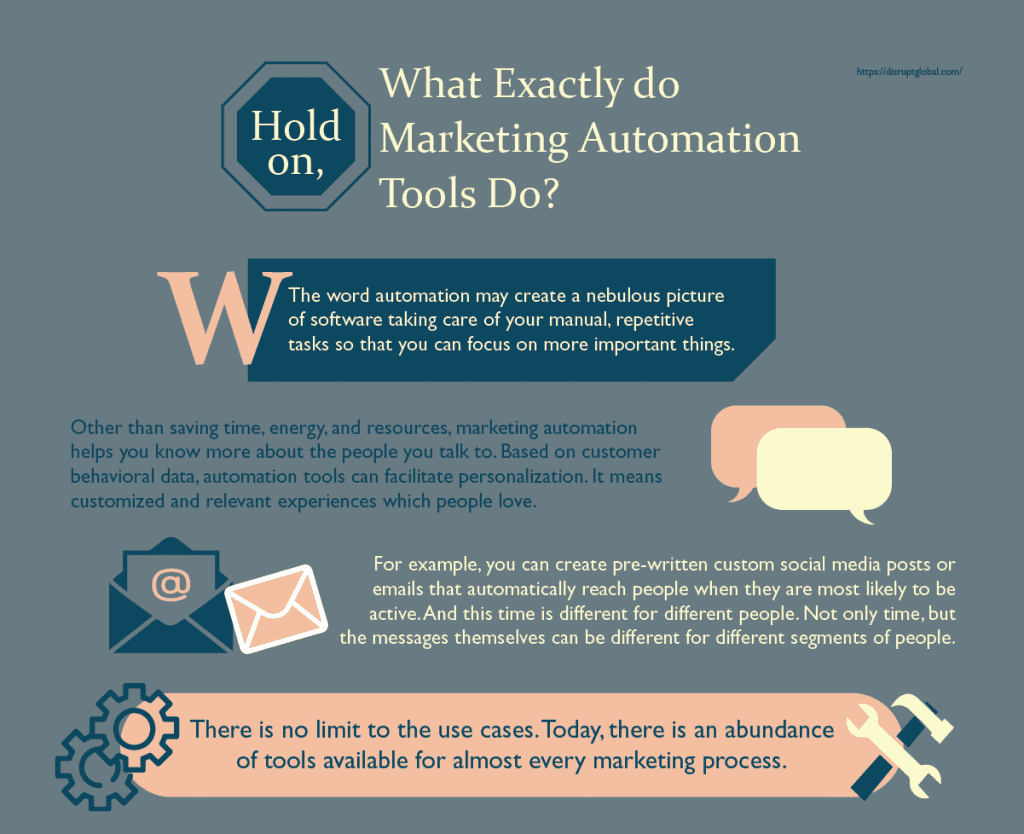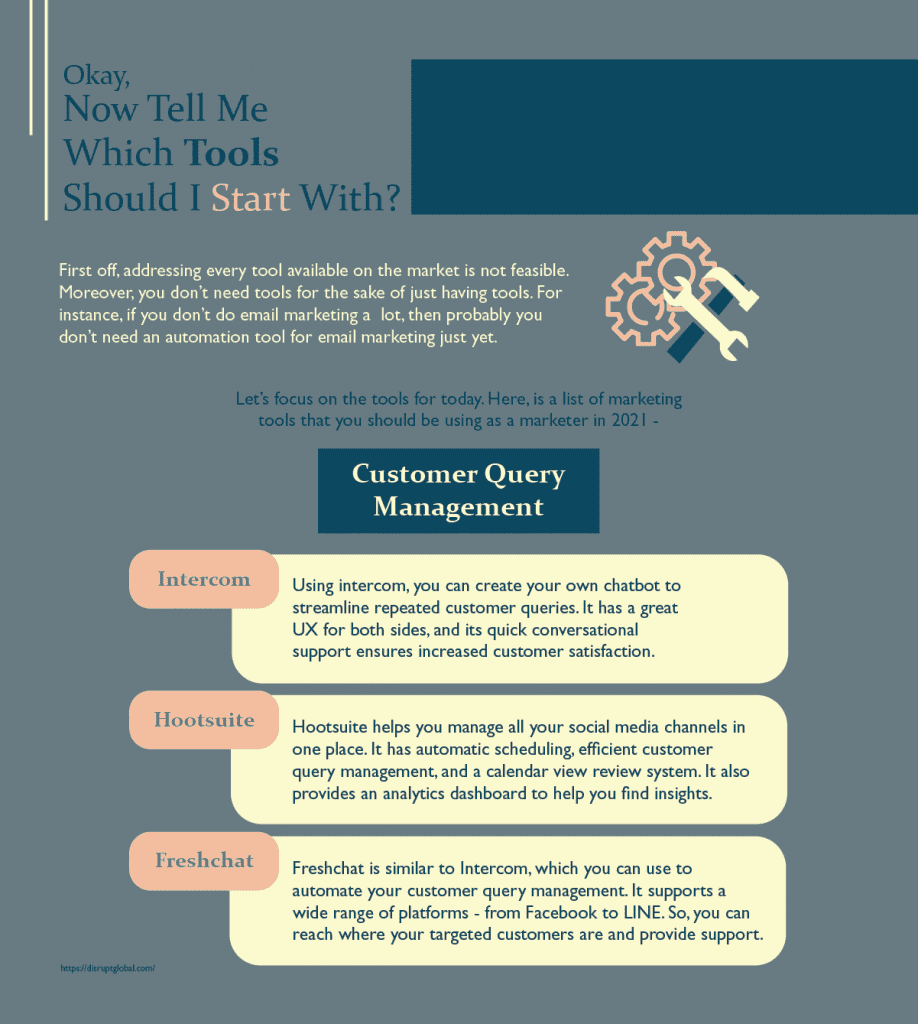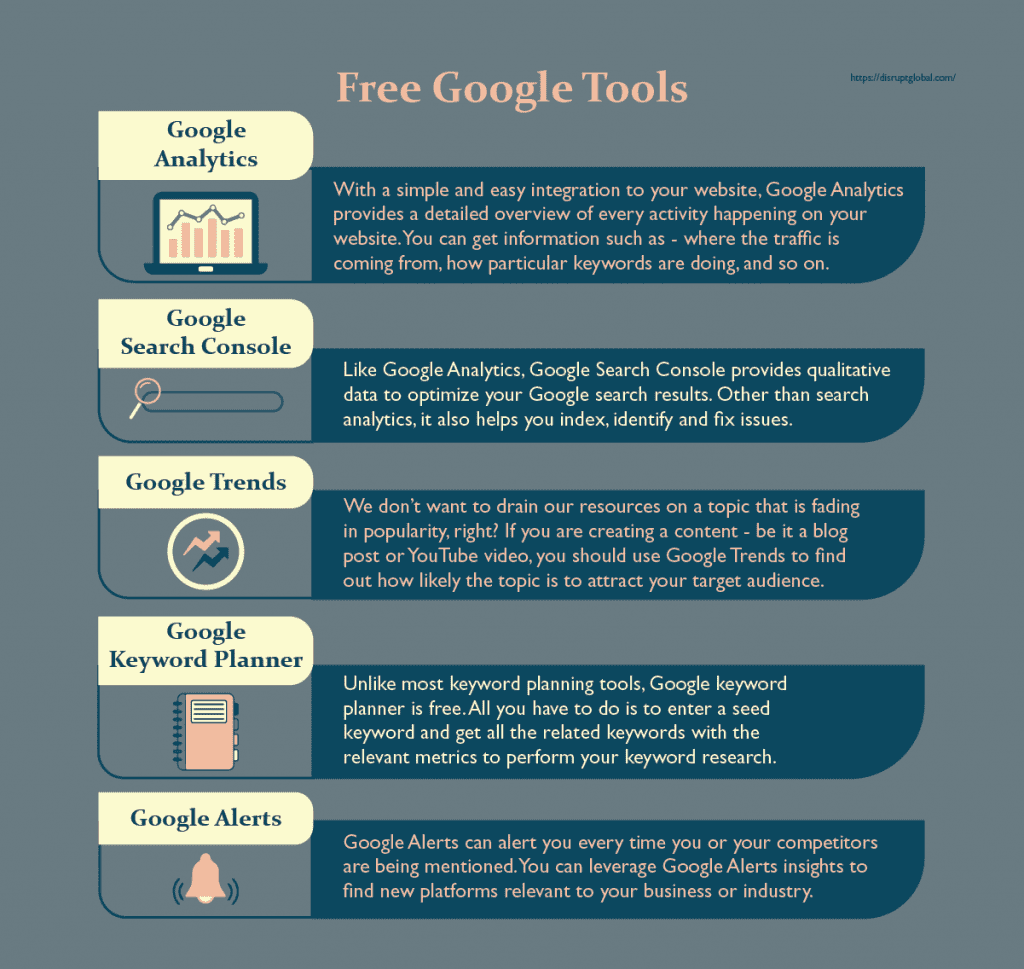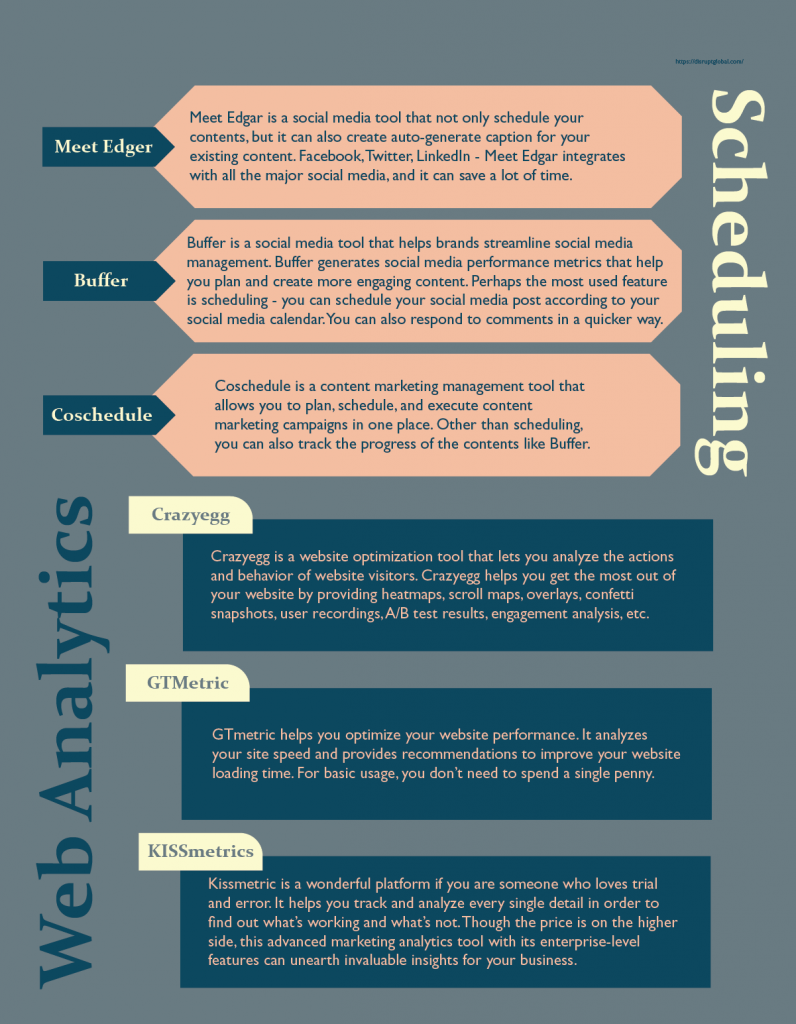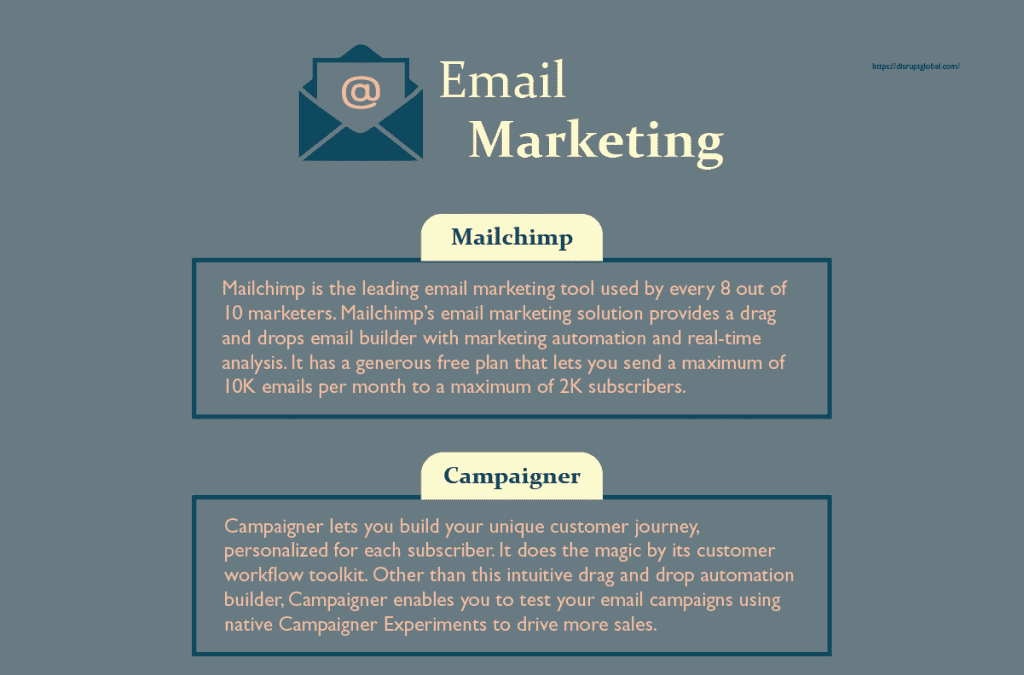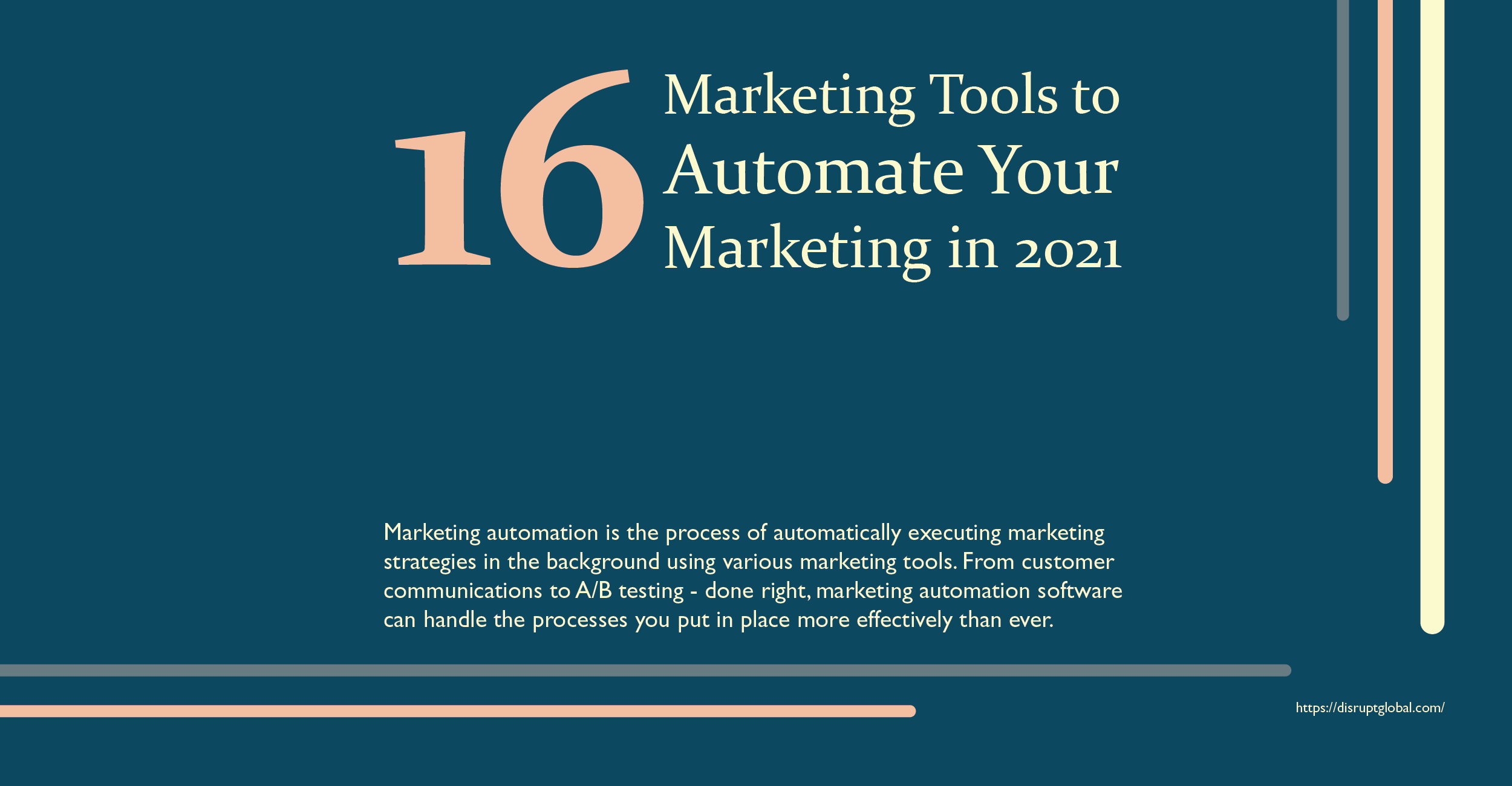
16 Marketing Tools to Automate Your Marketing in 2021
Posted by. Disrupt Tech. December 5, 2021
Marketing automation is the process of automatically executing marketing strategies in the background using various marketing tools. From customer communications to A/B testing – done right, marketing automation software can handle the processes you put in place more effectively than ever.
However, the “done right” part is crucial, and that is why we have created this content for you. This article will briefly guide you through the best marketing tools in 2021 that can streamline and personalize your marketing campaigns.
Hold on, What Exactly do Marketing Automation Tools Do?
Well, the word automation may create a nebulous picture of software taking care of your manual, repetitive tasks so that you can focus on more important things. For example, going on a vacation.
Yes, it’s right. But, it’s not the whole picture.
Other than saving time, energy, and resources, marketing automation helps you know more about the people you talk to. Based on customer behavioral data, automation tools can facilitate personalization. It means customized and relevant experiences which people love.
For example, you can create pre-written custom social media posts or emails that automatically reach people when they are most likely to be active. And this time is different for different people. Not only time, but the messages themselves can be different for different segments of people.
There is no limit to the use cases. Today, there is an abundance of tools available for almost every marketing process.
Okay, Now Tell Me Which Tools Should I Start With?
First off, addressing every tool available on the market is not feasible. Moreover, you don’t need tools for the sake of just having tools. For instance, if you don’t do email marketing a lot, then probably you don’t need an automation tool for email marketing just yet.
Everyone should leverage email marketing, though. But it’s a discussion for another day.
Anyway, let’s focus on the tools for today. Here, is a list of marketing tools that you should be using as a marketer in 2021 –
Customer Query Management
Intercom
Using intercom, you can create your own chatbot to streamline repeated customer queries. It has a great UX for both sides, and its quick conversational support ensures increased customer satisfaction.
Hootsuite
Hootsuite helps you manage all your social media channels in one place. It has automatic scheduling, efficient customer query management, and a calendar view review system. It also provides an analytics dashboard to help you find insights.
Freshchat
Freshchat is similar to Intercom, which you can use to automate your customer query management. It supports a wide range of platforms – from Facebook to LINE. So, you can reach where your targeted customers are and provide support.
Free Google Tools
Google Analytics
With a simple and easy integration to your website, Google Analytics provides a detailed overview of every activity happening on your website. You can get information such as – where the traffic is coming from, how particular keywords are doing, and so on.
Google Search Console
Like Google Analytics, Google Search Console provides qualitative data to optimize your Google search results. Other than search analytics, it also helps you index, identify and fix issues.
Google Trends
We don’t want to drain our resources on a topic that is fading in popularity, right? If you are creating a content – be it a blog post or YouTube video, you should use Google Trends to find out how likely the topic is to attract your target audience.
Google Keyword Planner
Unlike most keyword planning tools, Google keyword planner is free. All you have to do is to enter a seed keyword and get all the related keywords with the relevant metrics to perform your keyword research.
Google Alerts
Google Alerts can alert you every time you or your competitors are being mentioned. You can leverage Google Alerts insights to find new platforms relevant to your business or industry.
Scheduling
Meet Edger
Meet Edgar is a social media tool that not only schedule your contents, but it can also create auto-generate caption for your existing content. Facebook, Twitter, LinkedIn – Meet Edgar integrates with all the major social media, and it can save a lot of time.
Buffer
Buffer is a social media tool that helps brands streamline social media management. Buffer generates social media performance metrics that help you plan and create more engaging content. Perhaps the most used feature is scheduling – you can schedule your social media post according to your social media calendar. You can also respond to comments in a quicker way.
Coschedule
Coschedule is a content marketing management tool that allows you to plan, schedule, and execute content marketing campaigns in one place. Other than scheduling, you can also track the progress of the contents like Buffer.
Web Analytics
Crazyegg
Crazyegg is a website optimization tool that lets you analyze the actions and behavior of website visitors. Crazyegg helps you get the most out of your website by providing heatmaps, scroll maps, overlays, confetti snapshots, user recordings, A/B test results, engagement analysis, etc.
GTMetric
GTmetric helps you optimize your website performance. It analyzes your site speed and provides recommendations to improve your website loading time. For basic usage, you don’t need to spend a single penny.
KISSmetrics
Kissmetric is a wonderful platform if you are someone who loves trial and error. It helps you track and analyze every single detail in order to find out what’s working and what’s not. Though the price is on the higher side, this advanced marketing analytics tool with its enterprise-level features can unearth invaluable insights for your business.
Email Marketing
Mailchimp
Mailchimp is the leading email marketing tool used by every 8 out of 10 marketers. Mailchimp’s email marketing solution provides a drag and drops email builder with marketing automation and real-time analysis. It has a generous free plan that lets you send a maximum of 10K emails per month to a maximum of 2K subscribers.
Campaigner
Campaigner lets you build your unique customer journey, personalized for each subscriber. It does the magic by its customer workflow toolkit. Other than this intuitive drag and drop automation builder, Campaigner enables you to test your email campaigns using native Campaigner Experiments to drive more sales.
Bottom Line
The tools discussed above are just the tip of the iceberg. There are myriads of other tools for different marketing automation use cases. However, you have to start somewhere. The 16 tools we have discussed can be your ideal starting point for your future marketing automation journey.
